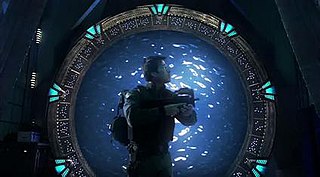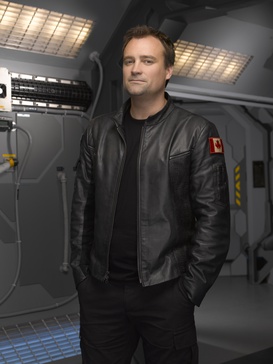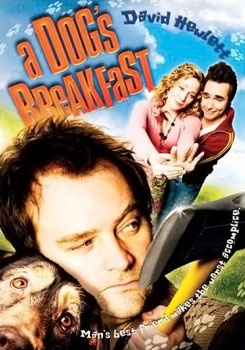
Landslides, also known as landslips, or rockslides, are several forms of mass wasting that may include a wide range of ground movements, such as rockfalls, mudflows, shallow or deep-seated slope failures and debris flows. Landslides occur in a variety of environments, characterized by either steep or gentle slope gradients, from mountain ranges to coastal cliffs or even underwater, in which case they are called submarine landslides.
Stargate Atlantis is an adventure and military science fiction television series and part of MGM's Stargate franchise. The show was created by Brad Wright and Robert C. Cooper as a spin-off series of Stargate SG-1, which was created by Wright and Jonathan Glassner and was itself based on the feature film Stargate (1994). All five seasons of Stargate Atlantis were broadcast by the Sci-Fi Channel in the United States and The Movie Network in Canada. The show premiered on July 16, 2004; its final episode aired on January 9, 2009. The series was filmed in and around Vancouver, British Columbia, Canada.

Amanda Tapping is a British-Canadian actress and director. She is best known for portraying Samantha Carter in the Canadian–American military science fiction television series Stargate SG-1,Stargate Atlantis, and Stargate Universe. She also starred as Helen Magnus in the science fiction-fantasy television series Sanctuary.

Dr. Samantha "Sam" Carter, USAF is a fictional character in the Canadian–American military science fiction Stargate franchise. Played by Amanda Tapping, she appears in all three shows in the franchise: Stargate SG-1, Stargate Atlantis, and Stargate Universe. She was a main character in all ten seasons of Stargate SG-1 (1997–2007). Following a recurring role in Stargate Atlantis for three seasons (2004–07), Carter became a main character in Season 4 of Atlantis (2007–08), and also appeared in the 2008 direct-to-DVD SG-1 films Stargate: The Ark of Truth and Stargate: Continuum. Amanda Tapping accepted a starring role in Sanctuary and appears in only the first and last episodes in Season 5 of Atlantis (2008–09). Carter also appears in two episodes of Season 1 of Stargate Universe.
Stargate is a military science fiction media franchise based on the film directed by Roland Emmerich, which he co-wrote with producer Dean Devlin. The franchise is based on the idea of an alien wormhole device that enables nearly instantaneous travel across the cosmos. The franchise began with the film Stargate, released on October 28, 1994, by Metro-Goldwyn-Mayer and Carolco, which grossed US$197 million worldwide. In 1997, Brad Wright and Jonathan Glassner created a television series titled Stargate SG-1 as a sequel to the film. This show was joined by Stargate Atlantis in 2004, Stargate Universe in 2009, and a prequel web series, Stargate Origins, in 2018. Also consistent with the same story are a variety of books, video games and comic books, as well as the direct-to-DVD movies Stargate: Children of the Gods, Stargate: The Ark of Truth, and Stargate: Continuum, which concluded the first television show after 10 seasons.

"Rising" is the pilot episode for season one of the military science fiction television series Stargate Atlantis, a Canadian-American spin off series of Stargate SG-1. The episode was written by executive producers Brad Wright and Robert C. Cooper, and directed by Martin Wood. The episode was the strongest episode of the whole series on Nielsen household ratings. The episode got strong reviews from major media publishers worldwide.

Meredith Rodney McKay, Ph.D, is a fictional character in the 2004 Canadian-American Sci-Fi Channel television series Stargate SG-1 and Stargate Atlantis, two military science fiction television shows about military teams exploring two galaxies via a network of alien transportation devices.

Dr. Elizabeth Weir is a fictional character in the Canadian-American Sci-Fi Channel television series Stargate Atlantis, a military science fiction show about a military team exploring another galaxy via a network of alien transportation devices. Elizabeth Weir is introduced as a recurring character in the Stargate SG-1 season seven two-parter, Lost City. She does not hold any military rank since she is a civilian. Weir is the leader of the Atlantis expedition in Stargate Atlantis until the last episode of season three, titled "First Strike".

Dr. Carson Beckett is a fictional Scottish character in the 2004 Canadian-American science fiction television series Stargate Atlantis, a spin-off series of Stargate SG-1. He is portrayed by Scottish-born Canadian actor Paul McGillion, who previously played Dr. Ernest Littlefield in the first season of SG-1. The character's Scottish nationality was only decided after McGillion's audition.
Dr. Radek Zelenka is a fictional character of a scientist in the 2004 television series Stargate Atlantis, portrayed by David Nykl. He is a member of the original expedition from Earth to the Ancient city of Atlantis in the Pegasus galaxy, which he joined after turning down a job at Masaryk University in his home country Czech Republic. His expertise on Ancient technology is only surpassed by Dr. Rodney McKay, with whom he shares a friendly rivalry. Zelenka's planned one-time appearance in the season 1 episode "Thirty-Eight Minutes" was followed by a recurring role for expository scenes with McKay and the leader of the expedition. Zelenka has since appeared in approximately half of each season's episodes and also appeared in the crossover episode "The Pegasus Project" of Stargate SG-1. The series finale of Atlantis, "Enemy at the Gate", marks his last appearance. For his portrayal of Radek Zelenka, David Nykl was nominated for a 2005 Leo Award in the category "Dramatic Series: Best Supporting Performance by a Male".

The mythology of the Stargate franchise is a complex and eclectic fictional backstory, which is presented as being historical, of the Stargate premise. A "rich mythology and world-building" are used to establish "a vast cosmology and an interesting alternate take on the history of Earth"; a defining feature is "its use of ancient mythology, with stories that take inspiration from multiple places around the globe". Narratives center around xeno-mythology as experienced by humans during episodic contact with alien races. Audiences across a variety of platforms - including TV series, novels, comics and movies - witness the people of Earth exploring a fictional universe using the Stargate. Species established early on in the franchise recur throughout, with one adversary often dominating a particular story arc, which can continue across several seasons.

A mudflow, also known as mudslide or mud flow, is a form of mass wasting involving fast-moving flow of debris and dirt that has become liquified by the addition of water. Such flows can move at speeds ranging from 3 meters/minute to 5 meters/second. Mudflows contain a significant proportion of clay, which makes them more fluid than debris flows, allowing them to travel farther and across lower slope angles. Both types of flow are generally mixtures of particles with a wide range of sizes, which typically become sorted by size upon deposition.

A Dog's Breakfast is a 2006 Canadian comedy independent film. It was the first film to be written and directed by British-born Canadian actor David Hewlett, who is best known for his role of Dr. Rodney McKay in the TV franchise Stargate. Hewlett created the film as a private off-season project and stars alongside his real-life sister Kate Hewlett and Stargate actors Paul McGillion, Christopher Judge and Rachel Luttrell. The film was produced by John Lenic and Jane Loughman.

Stargate Universe is a military science fiction drama television series and part of MGM's Stargate franchise. It follows the adventures of a present-day, multinational exploration team traveling on the Ancient spaceship Destiny several billion light years distant from the Milky Way Galaxy. They are now trying to figure out a way to return to Earth, while simultaneously trying to explore and to survive in their unknown area of the universe. The series, created by Brad Wright and Robert C. Cooper, premiered in the United States on Syfy on October 2, 2009. The series featured an ensemble cast and was primarily filmed in and around Vancouver, British Columbia, Canada. A second season of 20 episodes was announced by Syfy in December 2009.

Catherine Hickson is a Canadian volcanologist, formerly with the Geological Survey of Canada, part of Natural Resources Canada. Since 2014, she has been the chief operating officer for Dajin Resources Corp. and president, Tuya Terra Geo Corp. Hickson studied at the University of British Columbia and received her PhD in geology and volcanology in 1987.

Dr. Jennifer Keller is a fictional character from the Canadian-American military science fiction series Stargate Atlantis, a spin-off series to Stargate SG-1. She is played by Canadian actress Jewel Staite, who previously played the Wraith Ellia in season two episode "Instinct". She was created by the producers, who wanted someone to fill in for Carson Beckett after Paul McGillion's departure from regular status in the series. Keller had a recurring role in the fourth season, and was later promoted to a regular in Season 5.

Emily Stewart Lakdawalla is an American planetary geologist and former Senior Editor of The Planetary Society, contributing as both a science writer and a blogger. She has also worked as a teacher and as an environmental consultant. She has performed research work in geology, Mars topography, and science communication and education. Lakdawalla is a science advocate on various social media platforms, interacting with space professionals and enthusiasts on Facebook, Google+ and Twitter. She has appeared on such media outlets as NPR, BBC and BBC America.

STARGATE—Spacecraft Tracking and Astronomical Research into Gigahertz Astrophysical Transient Emission—is a radio-frequency (RF) technology facility which is located next to the SpaceX Starbase in south Texas.
Diana Lee Blaney is an American planetary scientist at the Jet Propulsion Laboratory, and a former chair of the Division for Planetary Sciences of the American Astronomical Society.















